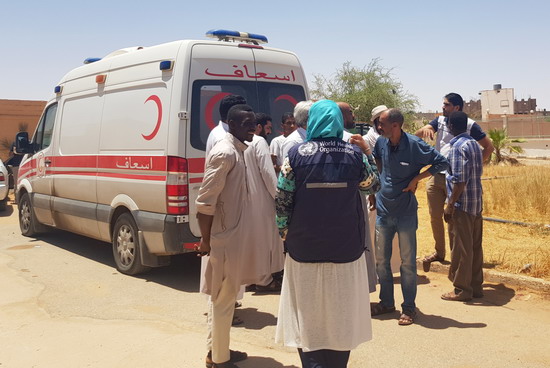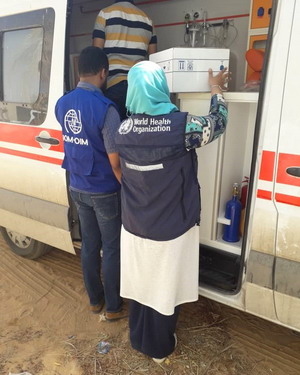 WHO worked with local authorities and other partners to send medical supplies to Ghat after the southwestern Libyan town was hit by floods
WHO worked with local authorities and other partners to send medical supplies to Ghat after the southwestern Libyan town was hit by floods
Ghat, Libya, 9 June — WHO has provided emergency and laboratory health supplies, scaled up disease surveillance, and deployed medical staff to support people affected by floods in the southwestern Libyan town of Ghat.
Three children and one adult died in the floods that struck Ghat in early June. More than 2500 people were displaced and many are now being hosted by relatives.
The town’s hospital was struck by the flooding, but is now partially operational. Pharmacies and the hospital’s warehouse were also flooded.
In the days after the flooding, WHO Libya rushed medical staff and supplies to the flood area to treat the injured and those forced to flee their homes.
“With the local health system compromised, people need medical care,” said Dr Jaffar Hussain, WHO Representative in Libya. “There are cases of people who are sick from drinking contaminated water or have flood-related injuries.”
WHO immediately released contingency stocks of emergency medical supplies, including cholera kits in case they are needed, from its warehouse in the southern Libyan town of Sabha. Responding to a request from Ghat hospital, WHO also sent laboratory reagents that will help diagnose diseases. Earlier in the year, WHO had supplied Ghat hospital with basic medical supplies as part of its regular support for the hospital.
 WHO deployed a psychiatrist to the flood zone to help people who were displaced in Ghat, southwest LibyaWHO also deployed a psychiatrist to the flood area to help people trying to cope with trauma. Local authorities have dispatched a team of doctors and other aid via convoy. Working with local government officials, WHO is coordinating the response of other health partners on the ground.
WHO deployed a psychiatrist to the flood zone to help people who were displaced in Ghat, southwest LibyaWHO also deployed a psychiatrist to the flood area to help people trying to cope with trauma. Local authorities have dispatched a team of doctors and other aid via convoy. Working with local government officials, WHO is coordinating the response of other health partners on the ground.
After natural disasters like floods, WHO’s disease surveillance system monitors potential disease outbreaks. “This is critical after floods, when people are displaced and the water supply and sanitation have been affected,” notes Dr Hussain. “WHO will provide immediate help and will also monitor the flood-affected communities carefully over the coming weeks, to stop any disease outbreak in its tracks.”
 WHO worked with local authorities and other partners to send medical supplies to Ghat after the southwestern Libyan town was hit by floods“There has been an outpouring of support and community spirit, especially given that this is an area of Libya where transportation and fuel can be scarce,” says Dr Jaffar. “People have pulled together to offer concrete support and help the people of Ghat in their time of trouble.”
WHO worked with local authorities and other partners to send medical supplies to Ghat after the southwestern Libyan town was hit by floods“There has been an outpouring of support and community spirit, especially given that this is an area of Libya where transportation and fuel can be scarce,” says Dr Jaffar. “People have pulled together to offer concrete support and help the people of Ghat in their time of trouble.”
WHO’s response in Ghat was made possible as a result of support from the Government of Italy and European Civil Protection & Humanitarian Aid Operations (ECHO).
For further information, please contact:
Laura Sheahen
Emergency Communications, WHO Libya
+216.26.300.388


